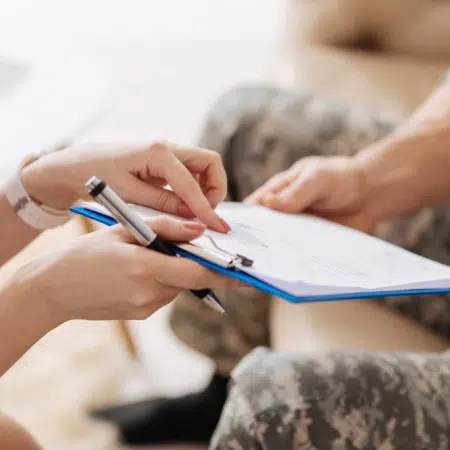Someone Is Going Door-to-Door During COVID-19? Be Wary
Home Help Center Someone Is Going Door-to-Door During COVID-19? Be Wary

Scammers have gotten creative as the COVID-19 pandemic has driven most people to spend their days in their homes – including creating phishing emails that attack both businesses and consumers. Fraudsters are currently taking advantage of the millions of people working from home. They may try representing themselves as the U.S. government, whether it be about a stimulus check, unemployment benefits, etc. Now, with the National Guard and other types of support being implemented in certain areas, the alarm is being sounded on scammers going door-to-door.
The National Guard is being deployed to assist with the Federal Emergency Management Agency work in some states. Some of the aspects of their duties include helping FEMA with gathering swabs and transporting them to certified labs for testing; delivering medical supplies as directed and creating medical stations. The National Guard says they have been activated for logistical support, and are not being deployed for enforcement. That means they will not be going door-to-door to implement any self-quarantines or shelter-in-place orders. If a “military personnel” comes to a person’s door posing as a National Guardsmen, the healthcare department or a healthcare professional regarding COVID-19, whether it is with a “test,” “cure” or regarding sheltering in place, it is likely a scam.
With that being the case, interactions someone may have with the National Guard would be at an identified FEMA drive-thru testing station or designated location for medical assistance. These two scenarios are examples of where you may be asked to provide personal information to the National Guard in reference to COVID-19 relief.
These types of door-to-door scams are not uncommon during a time of crisis. Scammers typically use them as an opportunity to pose as someone who can help people, but in reality, all they will do is hurt them.
If someone is going door-to-door posing as a utility worker, law enforcement, government agency or healthcare professional, ask for their identification before engaging in any conversation. Providing an ID card doesn’t always mean the person is legitimate because it is easy for a scammer to create what might look like an ID, dress up and act like someone else. If the person at the door is reluctant to show their ID or you have concerns about their legitimacy, close the door and call the organization that they are representing.
Also, if someone comes to a person’s door offering that if a fee is paid, they can provide faster service for aid, it is a scam. In fact, that is one of the go-to tactics scammers use to lure victims in. In the event that you are asked to provide personally identifiable information by someone on your doorstep, calling the organization that they are representing could prevent you from self-compromising sensitive information.
Finally, if someone is uncomfortable with anyone who comes to their door, they should call their local law enforcement. It is always better to be safe than sorry.
If people have questions regarding COVID-19 scams, they are encouraged to contact the Identity Theft Resource Center through the website to live chat with an expert advisor. For those that cannot access the website, call the toll-free hotline (888.400.5530) and leave a message for an advisor. While the advisors are working remotely, there may be a delay in responding but someone will assist you as quickly as possible.
Read the latest…
How much information are you putting out there? It’s probably too much. To help you stop sharing Too Much Information, sign up for the In the Loop.
Get ID Theft News
Stay informed with alerts, newsletters, and notifications from the Identity Theft Resource Center

